Title: MBA Capstone Analysis Recommendations
Authors: Justin Bowman, J. B. Eyring, Patrick DiPasquale, Colton Gordon, Walker Krebs, Drew Nelson, Brandon Sadur
Date: 1/29/2024
Brief Description: The project was conducted primarily by MBA students with the objective of enhancing the marketing, operations, and financial aspects of student-led clinics. Each of these areas was meticulously analyzed, incorporating current insights, identifying focus areas, and providing actionable recommendations for implementation. The authors highlight a gap in existing strategies for marketing and community outreach, suggesting the need for improved initiatives in these areas. Furthermore, the authors proposed implementing EPIC and role training, augmenting patient volume through targeted marketing strategies, and introducing mentorship programs as solutions to address the existing deficiencies in educational experiences for medical students. The concept of Value-Based Care was also suggested to better align clinic values with at-risk patients, wherein payers fund the clinic and quality care is rewarded with shared cost savings. This ideology was supported by an in-depth analysis of student-led clinics in Salt Lake City.
Copyright: Academy of Health Sciences Educators ©2024
A Perspective on Research into Student-Led Clinics
Title: A Perspective on Research into Student-Led Clinics
Presenter/Author: Tessa Jolley
Date: 1/29/2024
Brief Description: This project aimed to explore existing research conducted on student-led clinics within the country, focusing on the organization of advocacy, care, and education. The author highlights the strengths of student-led clinics, emphasizing their role in serving the community and providing valuable educational opportunities for students. However, the project also identifies challenges such as the lack of faculty staffing and funding as significant drawbacks associated with these clinics.
Copyright: Academy of Health Sciences Educators ©2024
Partnering with CHWs to Engage in Community-Based Participatory Research
Title: Partnering with CHWS to Engage in Community-Based Participatory Research
Presenter: Karishma Shaw
Authors: Karishma Shaw, Jazmine Abril, Sonia Sehgal, Siale Teaupa
Date: 1/29/2024
Brief Description: Qualitative research serves as a vital tool for delving into the experiences and perspectives of underserved populations. This project was dedicated to exploring the interactions between underserved communities and the local healthcare system in Utah, with a focus on understanding the nuances of these experiences across different groups. Collaborating closely with six Community Health Workers (CHWs), the project team tailored interview questions to suit the unique contexts of each community. CHWs played a pivotal role in facilitating focus groups, transcribing discussions, and ensuring accurate translation when needed. The project reached its culmination through a thorough qualitative analysis employing an inductive approach, aimed at uncovering and refining emergent themes within the data. Through this process, eight major themes emerged: barriers to accessing care, personal and systemic trauma, humanistic healthcare, building relationships, cultural competency, dimensions of health, navigating the healthcare system, and advocacy. These themes offer valuable insights into the challenges faced by underserved communities in accessing healthcare services, as well as the strategies and resources that can support more equitable and inclusive healthcare practices.
Copyright: Academy of Health Sciences Educators ©2024
Rose Park Community Health Committee Sustainably Increases Student Engagement
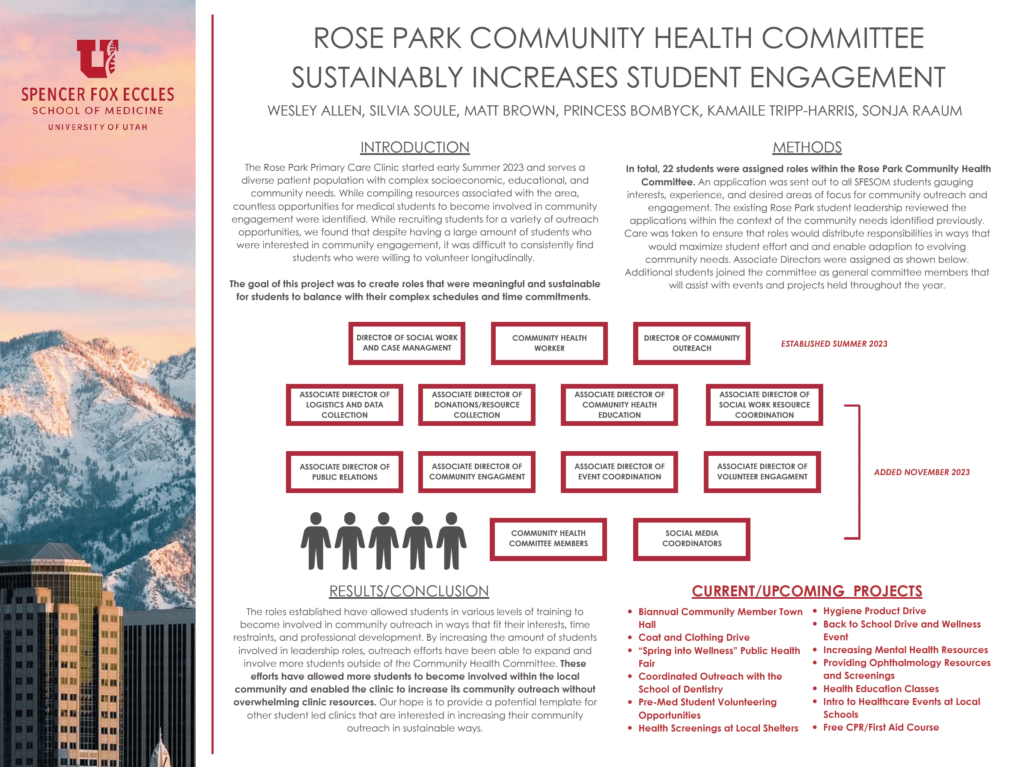
Title: Rose Park Community Health Committee Sustainably Increases Student Engagement
Authors: Wesley Allen, BS, Silvia Soule, BS, Matthew Brown, BS, Kamaile Tripp-Harris, CHW, Rawad Farhat, MD, Sonja Raaum, MD
Brief Description: The Rose Park Primary Care Clinic, established in early summer 2023, caters to a diverse patient population with multifaceted socioeconomic, educational, and community needs. Recognizing the area’s challenges, the clinic identified numerous opportunities for medical students to engage with the community. However, despite considerable student interest in community engagement, consistent longitudinal volunteering proved challenging to sustain.
Wellness Without Borders: Health Fair Provides Community Collaboration
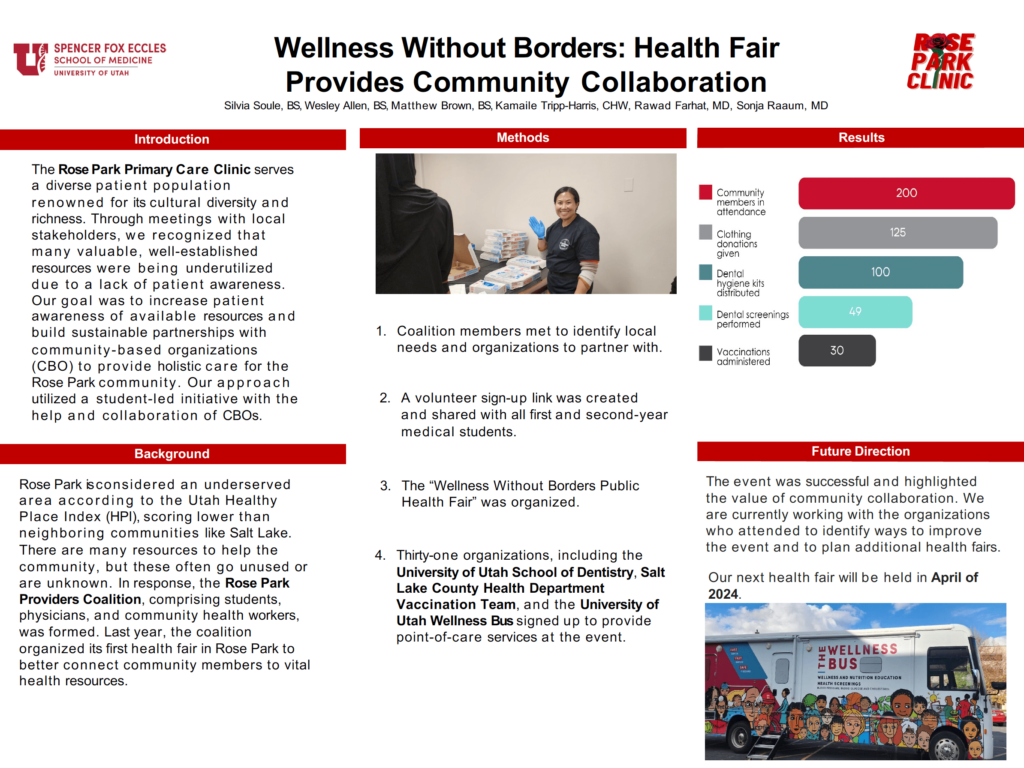
Title: Wellness Without Borders: Health Fair Provides Community Collaboration
Authors: Silvia Soule, BS, Wesley Allen, BS, Matthew Brown, BS, Kamaile Tripp-Harris, CHW, Rawad Farhat, MD, Sonja Raaum, MD
Brief Description: The Rose Park Primary Care Clinic, serving a diverse patient population, identified underutilized resources due to patient unawareness. To address this, a coalition comprising students, physicians, and community health workers organized a health fair aimed at increasing patient awareness and building sustainable partnerships with community-based organizations. The fair, held in an underserved area according to the Utah Healthy Place Index, aimed to connect community members with vital health resources.
The Rose Park Clinic Library: A Student-Led Project to Establish a Sustainable Library for the Patients of Rose Park Primary Care Clinic
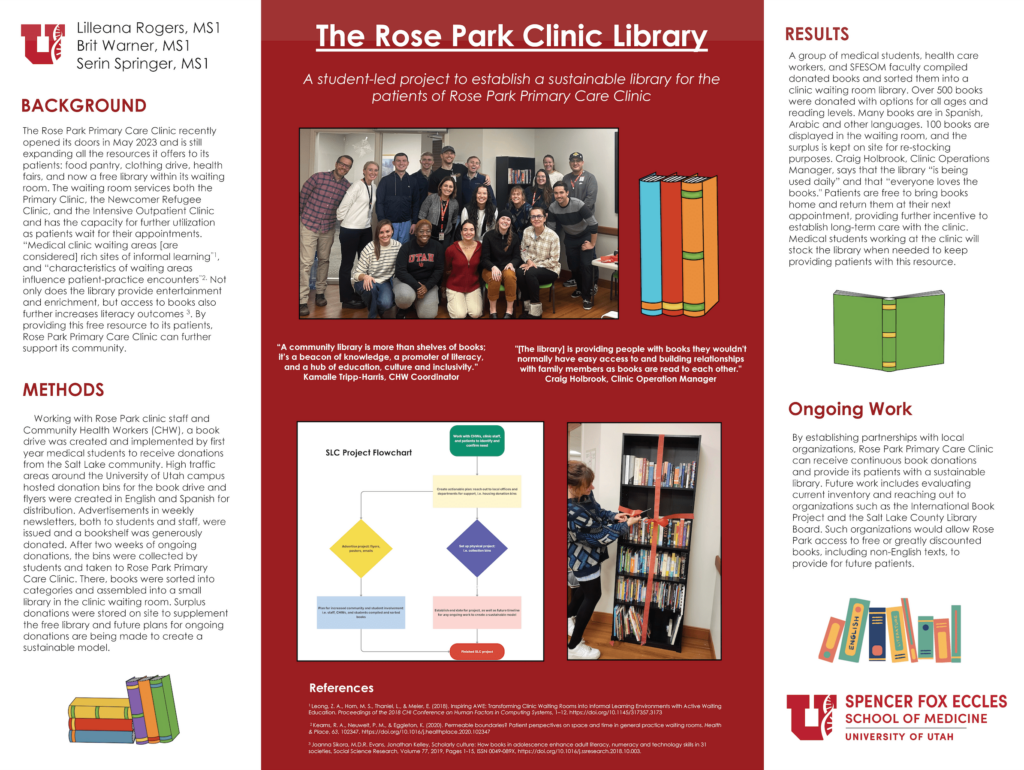
Title: The Rose Park Clinic Library: A Student-Led Project to Establish a Sustainable Library for the Patients of Rose Park Primary Care Clinic
Authors: Lilleana Rogers, Brit Warner, Serin Springer
Brief Description: The Rose Park Primary Care Clinic, established in May 2023, is continuously expanding its resources to better serve its patients, including a food pantry, clothing drive, health fairs, and now a free library in its waiting room. This initiative aims to utilize the waiting room space effectively, recognizing it as a valuable site for informal learning and influencing patient-practice encounters. The addition of a library not only provides entertainment and enrichment but also enhances literacy outcomes for the community, aligning with the clinic’s goal of supporting its patients beyond medical care.
Midvale CBC Student-Led Clinic and the Mission-Driven Curriculum: The Students, The Clinics, The Volunteers
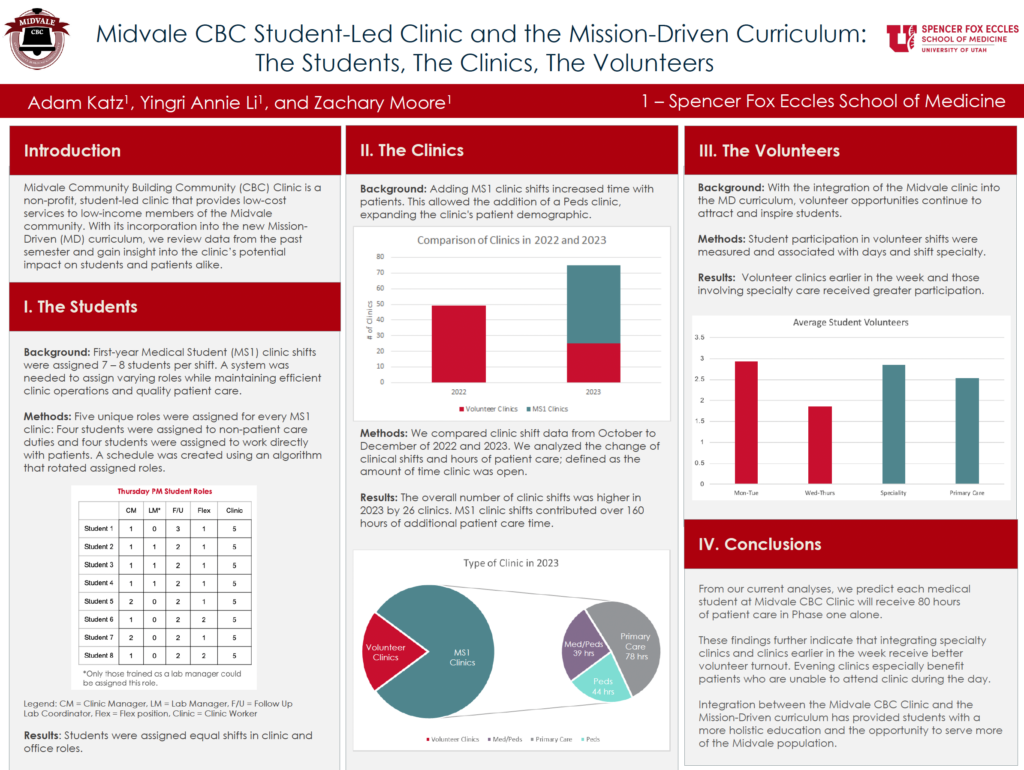
Title: Midvale CBC Student-Led Clinic and the Mission-Driven Curriculum: The Students, The Clinics, The Volunteers
Authors: Adam Katz , Yingri Annie Li , and Zachary Moore
Brief Description: The Midvale Community Building Community (CBC) Clinic, a non-profit student-led clinic, offers low-cost services to low-income individuals in the Midvale community. As part of the new Mission-Driven (MD) curriculum, data from the previous semester is analyzed to understand the clinic’s potential impact on both students and patients.
Integrating Pharmacy and Nutrition Services into Patient Care at the Midvale CBC Student-Led Clinic
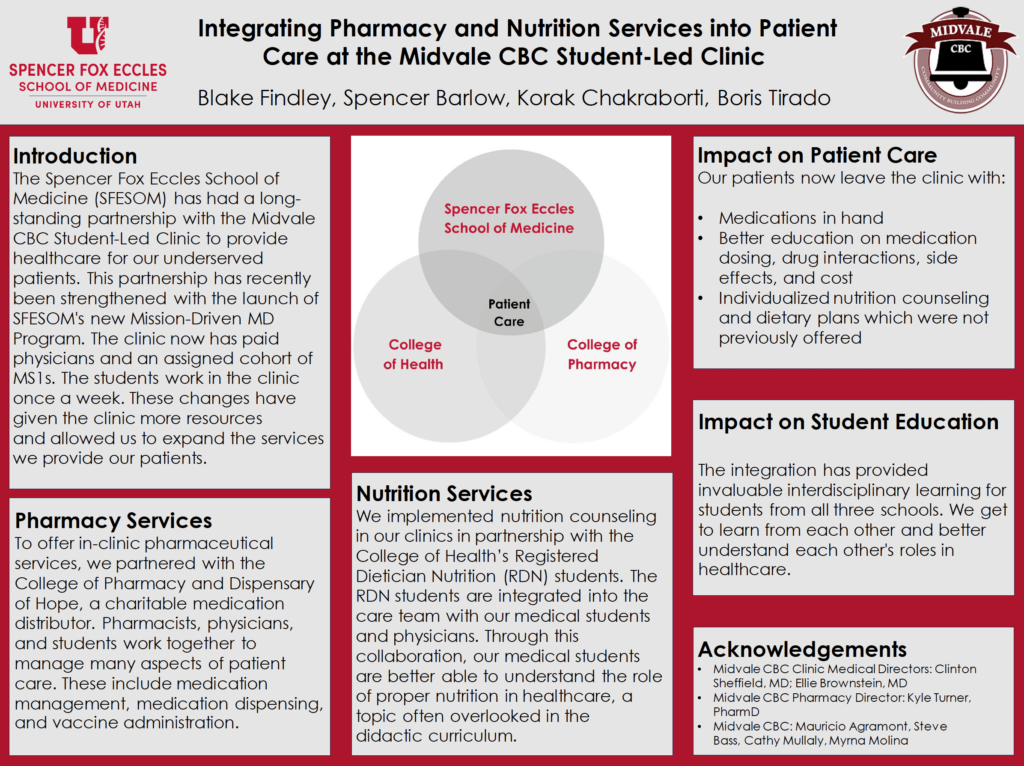
Title: Facilitating Interdisciplinary Teamwork: Integrating Pharmacy and Nutrition Services into Patient Care at the Midvale CBC Student-Led Clinic
Authors: Blake Findley, Spencer Barlow, Korak Chakraborti, Boris Tirado
Brief Description: The partnership between the Spencer Fox Eccles School of Medicine (SFESOM) and the Midvale CBC Student-Led Clinic has been reinforced through SFESOM’s Mission-Driven MD Program, resulting in the clinic gaining paid physicians and a dedicated group of MS1s. With MS1s contributing weekly, the clinic has expanded its resources, allowing for the provision of additional services to underserved patients. Additionally, in-clinic pharmaceutical services have been established through a partnership with the College of Pharmacy and Dispensary of Hope, facilitating medication management, dispensing, and vaccine administration with collaboration among pharmacists, physicians, and students.
Creation of a Student-Led Ophthalmology Clinic
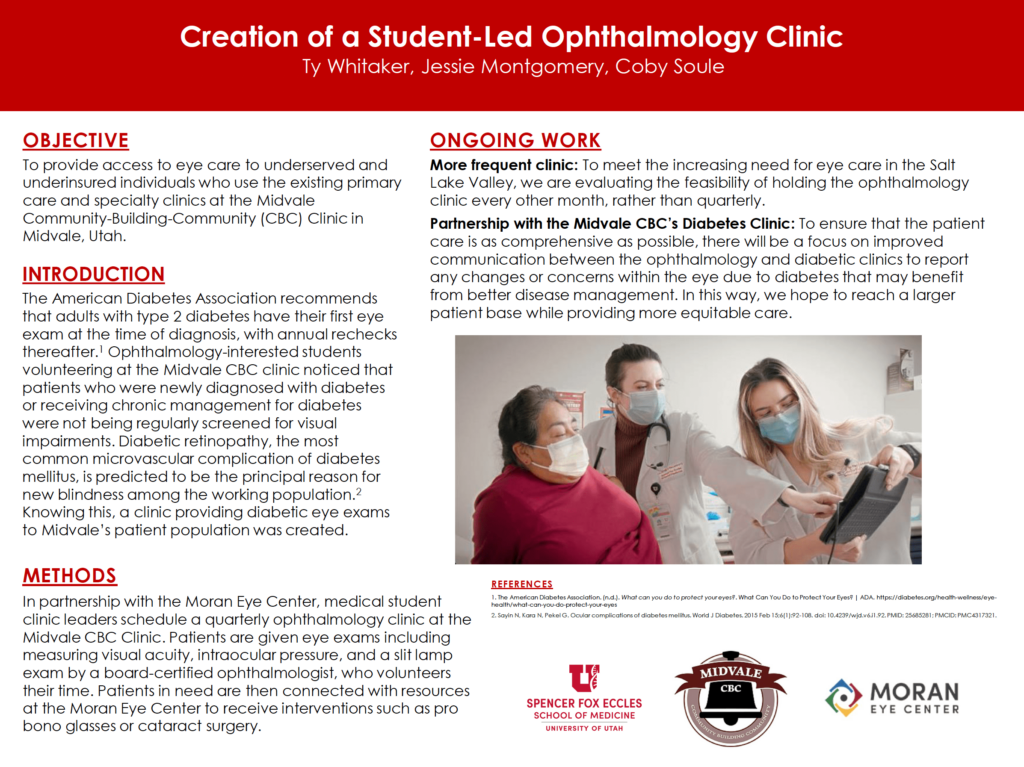
Title: Creation of a Student-Led Ophthalmology Clinic
Authors: Ty Whitaker, Jessie Montgomery, Coby Soule
Brief Description: The goal is to offer eye care services to underserved and underinsured individuals utilizing existing primary care and specialty clinics at the Midvale CBC clinic in Utah. Concerns arose when ophthalmology-interested students noticed a lack of regular screening for visual impairments among patients newly diagnosed with diabetes or receiving chronic management. Given the risk of diabetic retinopathy, the leading cause of new blindness among working adults, a clinic was established to provide diabetic eye exams to address this gap in care for the Midvale community.
